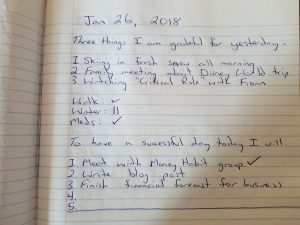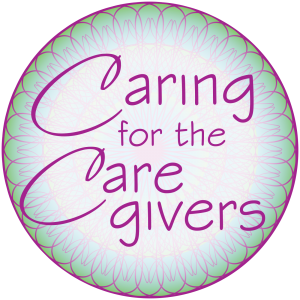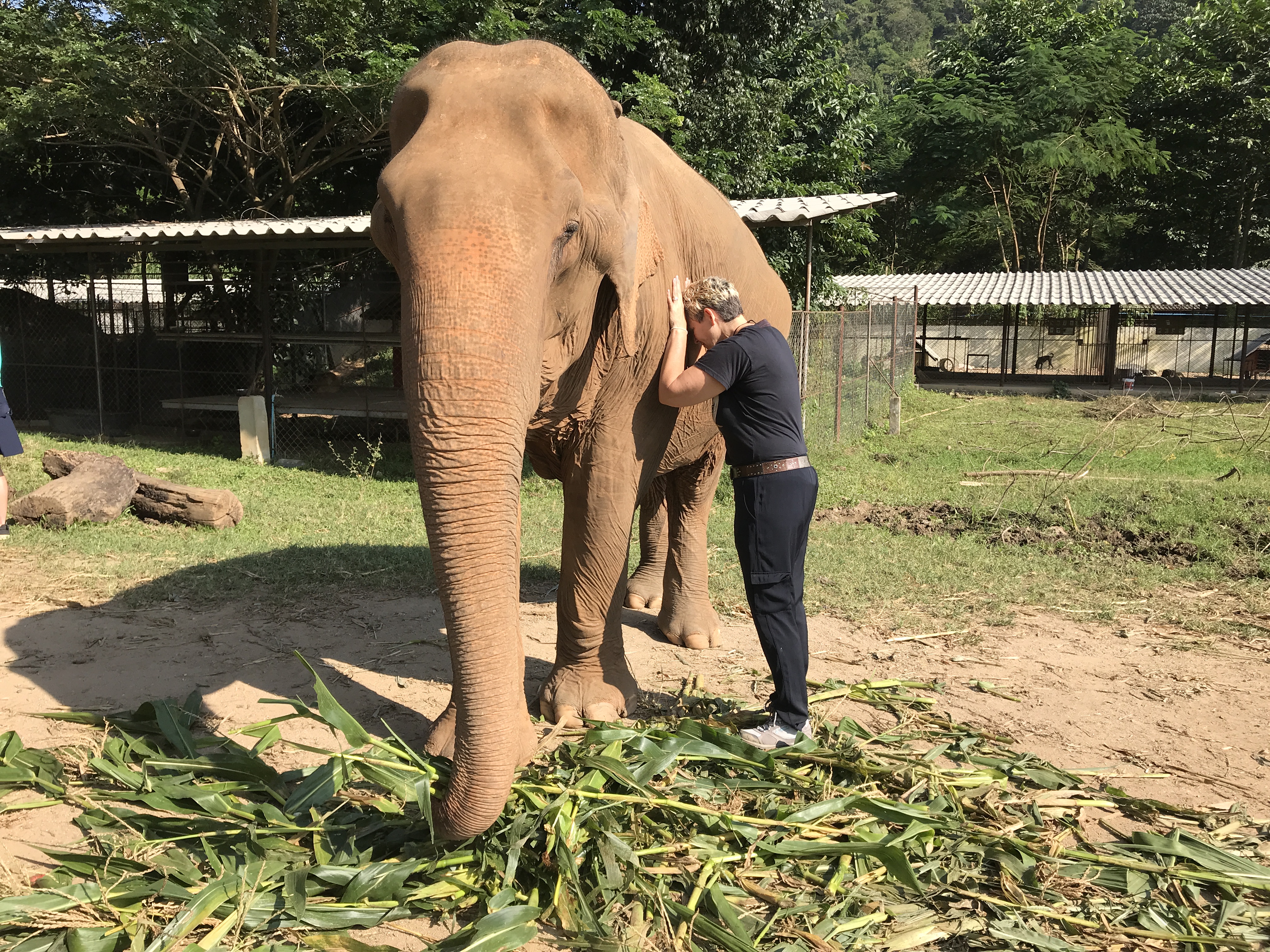
I am starting with a notebook I had in my desk.
I heard about gratitude journals years ago and brushed them off as a waste of time (I have a very “left-brain” background).
After starting my work with Indrani’s Light Foundation I would hear Indrani talking about her gratitude journal, but still filed it away as “something I didn’t have time for”.
Last year in October, I finally decided to give the gratitude journal idea a try but didn’t really have any idea how to get started. I knew that writing a traditional journal entry in complete sentences didn’t feel like something I would actually do, so I worked through a few ideas, and finally landed on something that worked.
Now, when I say “worked,” I mean that I successfully journaled for 17 out of 61 days in October and November before stopping completely in December.
You must get started somewhere right?
In episode 15 of the Caring for the Cargivers Podcast Indrani, Amy, and I discussed some of our self-care practices. One of the self-care practices I want to improve upon in 2018 is keeping a gratitude and success journal. When I started keeping my own journal in late 2017 I had no idea what I was doing, but over time I managed to find a system that works for me.
To kick off 2018 I thought I would share how I am using my gratitude and success journal in the hopes it might help you give the idea a try.
How to start a gratitude and success journal (the Jeremie way)

My template includes: gratitude, habits, and successful day.
- Buy a journal – I found an empty journal we had sitting around the house (see the image at the start of the post).
- Decide what you want to track daily in your journal – I track gratitude, habits, and successful days.
- Create a template for your journal entries on the first page – or if you are less worried about structure skip this step. Remember this is YOUR journal.
- Pick how often you want to write in your journal – I am committed to writing in mine every week day, if I make entries on the weekend that is a bonus. I also try to write in mine first thing in the morning before starting my work day.
- Start using your journal – I am re-kickstarting my journal Friday January 26th.
- Don’t beat yourself up when you get off track. Just start again.
How I use my journal

An example of my entry for January 26th.
I start each day’s entry by reflecting on the previous day and writing down three things that I am grateful for from that day.
I reflect on my previous day for a couple of reasons:
- I find I am usually too tired before bed to properly reflect on my day and write down my thoughts. If I try to journal at night, I just don’t do it.
- By writing these three things down first thing in the morning I get an instant boost of energy to my day.
Section Two: Habit Formation
This middle section of my journal entry is dedicated to forming new positive habits. Currently I am trying to go for a walk, drink 4-8 glasses of water, and take my vitamins and other meds every day.
To form these activities into habits I know I have to repeat them enough times that they become routine: actions I take without even having to think about them. By recording my success with each habit in my journal I am reminded to complete each daily task and eventually (hopefully) form a new habit.
Section Three: Successful Day
Every day I select 3-5 tasks from my much longer task list that, if I finish them, will make me feel like I accomplished something and made my day successful.
This section is super important to my day. In the past I have always worked through my day using a long list of tasks I need to complete. What I discovered was, even when I finished a lot of the tasks on that list, I wasn’t feeling very accomplished. There were so many more tasks on the list.
For the end of 2017, and for 2018 I have stopped working of my long task list. Instead, I record 3-5 tasks that I need to complete each day that will make me feel like the day was successful.
If I manage to get more tasks done…great! But achieving more than the five tasks listed in my journal is not a requirement. Only the three to five in the journal need to be finished for my day to be successful.
At the end of 2017 this tweak to my daily routine made a big difference. I found that, at the end of the day, while wrapping things up and transitioning to family time I was feeling much more accomplished and had higher levels of energy.
By limiting my expectations of myself (which usually were not very realistic or fair) I have set myself up to succeed and put myself in a better headspace for the rest of the day and evening.
Journaling every day
Right now, I have a one-day-in-a-row streak going for my 2018 gratitude and success journal.
I am hoping that I can make writing in this journal a successful part of my self-care routine. However, I am also not going to beat myself up for not getting this self-care practice “right”. I think that is an important piece of any self-care routine: if the self-care routine makes you feel worse because you aren’t doing it, then find something different to try.
A self-care routine that makes you feel guilty isn’t doing its job.
I am looking forward to getting better at journaling, and I would love your help. Let me know in the comments below what your gratitude journal (or any sort of daily journal practice) looks like.
 Sheryl Sandberg wrote this book after husband died suddenly. The book explores how Sheryl and her children recover and rebound from the horrible event while building their reslience, finding greater meaning, and gaining a greater appreciation for their lives. In this episode Indrani, Amy, Stacie, and Jeremie share their takeaways from reading the book and how you can apply Sheryl’s lessons to the daily challenges you are experiencing at work and in your personal life.
Sheryl Sandberg wrote this book after husband died suddenly. The book explores how Sheryl and her children recover and rebound from the horrible event while building their reslience, finding greater meaning, and gaining a greater appreciation for their lives. In this episode Indrani, Amy, Stacie, and Jeremie share their takeaways from reading the book and how you can apply Sheryl’s lessons to the daily challenges you are experiencing at work and in your personal life.



